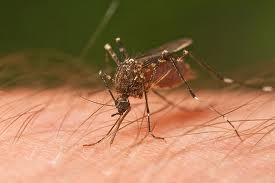Malaria ranks number one in Dangme East
 Malaria ranks number one among the top 10 diseases in the Dangme East District of Ghana, Mrs Cecilia K. Partey of the Ghana Education Service and School Health Education Programme Coordinator of the Dangme East District has stated.
Malaria ranks number one among the top 10 diseases in the Dangme East District of Ghana, Mrs Cecilia K. Partey of the Ghana Education Service and School Health Education Programme Coordinator of the Dangme East District has stated.
Advertisement
In 2008, the district recorded 33,243 cases of malaria and this reduced to 31,461 in 2009, increased to 31,505 in 2010 and 32,600 in 2011.
Acute respiratory infection follows cases of malaria, followed by skin diseases and ulcer, anaemia, intestinal worms, rheumatism, hypertension, home accidents and pneumonia.
Mrs Partey, who made this known at the annual health meeting which took place at the Dangme East District Health Centre in Ada, also said the health facility’s quarterly, half yearly and annual reports showed that malaria was frequently reported by patients who sought medical care at the health facility.
She said the aim of the meeting was to educate communities, churches and schools on the prevention of malaria, maternal and infant mortality.
The meeting was organised by the Dangme East District Malaria Awareness Club (DEDMAC).
She said malaria was caused by a parasite called plasmodium, and when it bites its victim, the parasites multiply in the liver, and then infect the red blood cells.
She added that key interventions to control malaria include, prompt and effective treatment with artemisinin-based combination therapies, use of insecticide treated nets and indoor residual spraying with insecticide to control the vector mosquitoes and also proper environmental sanitation.
An official of DEDMAC, Mr Isaac Adjaottor said the club, in partnership with other organisations such as Japan International Cooperation Agency (JICA), West African International Parasitic Control (WACIPAC), Partnership for Child Development (PCD), Noguchi Memorial Institute for Medical Research (NMIMR), Community Direct Development Foundation (CDDF), Dangme East District Assembly, Dangme East District Education, Dangme East District Health and World Health Organisation (WHO) had carried out screening and treatment of malaria and other parasitic diseases in over 40 schools and several communities in the district.
He said the organisation had also collaborated with some NGOs to train science students in junior and senior high schools on how to identify parasitic diseases under the microscope.
He hinted that DEDMAC was distributing long lasting insecticide treated bed nets in over 10 communities in the district.
A retired director of the National Commission for Civic Education (NCCE), Mr Aabu Jumbaa, who also addressed the meeting, advised the people to keep clean surroundings to avoid the spread of diseases.
“Pregnant women are particularly vulnerable to malaria as pregnancy reduces a woman’s immunity. For the unborn child, maternal malaria increases the risk of spontaneous abortion, stillbirth, premature delivery and low birth weight - a leading cause of child mortality”, she stated.
Story by Kweku Bolton
*The writer is a freelance journalist



